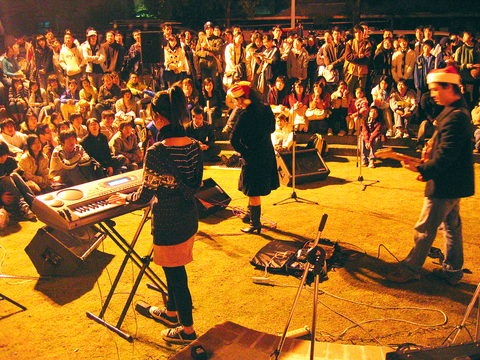Two decades ago, rock 'n' roll was a sound for the young and rebellious, played live at only a few underground bars. A decade later, Taiwan's rock music came out of the closet and spawned big events like Spring Scream (春天吶喊), Formoz Festival (野台開唱) and Hohaiyan Rock Festival (海洋音樂祭).
For the past couple of years, the indie music scene has taken on a more spontaneous vibe at free street music gigs like the Watermelon Rock Festival (搖滾西瓜音樂季). Organized by the guitar club at National Taiwan Normal University (NTNU, 國立台灣師範大學), it features 15 bands jamming for eight hours nonstop, tomorrow at Shida Park (師大公園), Taipei.

PHOTO: COUTESY OF WATERMELON ROCK FESTIVAL
The semiannual festival was started five years ago by Bear Boss (熊老大), a member of the band Inferno, which was formed of guitar club members. He decided to change the group's irregular performances into a scheduled event. The best time for the show, the pioneers reckoned, was during the university's anniversary celebrations in June, also the time of the Watermelon Festival, when students traditionally give the fruit to their sweethearts.
The festival's rules are simple: at least one member of each band must be an NTNU student or alumnus and the event itself must remain avowedly independent and anticapitalist. Last December, the festival moved out of the campus to Shida park.
"We'd like to continue the street rock spirit from last year, highlighting music that is untainted by the mainstream," this year's festival coordinator and electric guitarist Hsu Ting-yu (許庭毓) said.
This year's lineup sees the return of Inferno, the members of which are now office workers who transform into heavy-metal bad boys at night. NTNU's musical luminaries include folk rock outfit Who Knows Band (天曉得) and Greenbean starring A-Mai (阿賣), who flunked classes because of jamming sessions.
Another big draw is the all-girl punk rock band Da Mo Wang (大魔王), who have been playing together since high school.
The festival organizers, in true anarchical style, have bent the rules and invited guest bands Clay Pigeon (陶土飛靶), to represent the National Taiwan University (國立台灣大學), and the award-winning Echo (回聲樂團), which consists of National Tsinghua University (清華大學) graduates.
The festival's anticapitalist ethos comes at a cost: limited sponsorship. But despite struggling with a simple sound system, the spirit of rock looks set to live on. "The Watermelon Rock Festival will be back next year, at the same place, and the same time," Hsu said.
Festival notes:
What: The 10th Watermelon Rock Festival
(第十屆搖滾西瓜音樂季)
Where: Shida Park (師大公園), near Shida night market
When: Sunday from 1pm to 9pm
On the Net: blog.roodo.com/ntnu_rocker

Sept.16 to Sept. 22 The “anti-communist train” with then-president Chiang Kai-shek’s (蔣介石) face plastered on the engine puffed along the “sugar railway” (糖業鐵路) in May 1955, drawing enthusiastic crowds at 103 stops covering nearly 1,200km. An estimated 1.58 million spectators were treated to propaganda films, plays and received free sugar products. By this time, the state-run Taiwan Sugar Corporation (台糖, Taisugar) had managed to connect the previously separate east-west lines established by Japanese-era sugar factories, allowing the anti-communist train to travel easily from Taichung to Pingtung’s Donggang Township (東港). Last Sunday’s feature (Taiwan in Time: The sugar express) covered the inauguration of the

The corruption cases surrounding former Taipei Mayor and Taiwan People’s Party (TPP) head Ko Wen-je (柯文哲) are just one item in the endless cycle of noise and fuss obscuring Taiwan’s deep and urgent structural and social problems. Even the case itself, as James Baron observed in an excellent piece at the Diplomat last week, is only one manifestation of the greater problem of deep-rooted corruption in land development. Last week the government announced a program to permit 25,000 foreign university students, primarily from the Philippines, Indonesia and Malaysia, to work in Taiwan after graduation for 2-4 years. That number is a

In a stark demonstration of how award-winning breakthroughs can come from the most unlikely directions, researchers have won an Ig Nobel prize for discovering that mammals can breathe through their anuses. After a series of tests on mice, rats and pigs, Japanese scientists found the animals absorb oxygen delivered through the rectum, work that underpins a clinical trial to see whether the procedure can treat respiratory failure. The team is among 10 recognized in this year’s Ig Nobel awards (see below for more), the irreverent accolades given for achievements that “first make people laugh, and then make them think.” They are not

This Qing Dynasty trail takes hikers from renowned hot springs in the East Rift Valley, up to the top of the Coastal Mountain Range, and down to the Pacific Short vacations to eastern Taiwan often require choosing between the Rift Valley with its pineapple fields, rice paddies and broader range of amenities, or the less populated coastal route for its ocean scenery. For those who can’t decide, why not try both? The Antong Traversing Trail (安通越嶺道) provides just such an opportunity. Built 149 years ago, the trail linked up these two formerly isolated parts of the island by crossing over the Coastal Mountain Range. After decades of serving as a convenient path for local Amis, Han settlers, missionaries and smugglers, the trail fell into disuse once modern roadways were built